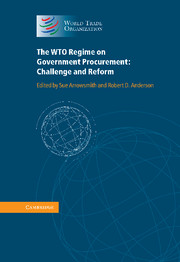Book contents
- Frontmatter
- Contents
- List of contributors
- Foreword by Pascal Lamy
- Perspective of the Chairman of the WTO Committee on Government Procurement, Nicholas Niggli (Switzerland)
- Preface
- Disclaimer
- PART I The WTO regime on government procurement
- PART II Expanding the scope of the Agreement on Government Procurement: accession and coverage
- PART III Revision of the procedural rules and other transparency provisions of the Agreement on Government Procurement
- PART IV Developing countries in the WTO procurement regime
- PART V Economic and social development (horizontal policies) in government procurement
- PART VI Enforcement and remedies
- PART VII Multilateralism and regionalism
- PART VIII Challenges and new directions
- 22 Ensuring integrity and competition in public procurement markets: a dual challenge for good governance
- 23 Developing multilateral rules on government procurement: the value of soft law
- 24 Work of UNCITRAL on government procurement: purpose, objectives and complementarity with the work of the WTO
- 25 Global procurement law in times of crisis: new Buy American policies and options in the WTO legal system
- 26 Procurement in times of crisis: lessons from US government procurement in three episodes of ‘crisis’ in the twenty-first century
- Index
23 - Developing multilateral rules on government procurement: the value of soft law
from PART VIII - Challenges and new directions
Published online by Cambridge University Press: 07 September 2011
- Frontmatter
- Contents
- List of contributors
- Foreword by Pascal Lamy
- Perspective of the Chairman of the WTO Committee on Government Procurement, Nicholas Niggli (Switzerland)
- Preface
- Disclaimer
- PART I The WTO regime on government procurement
- PART II Expanding the scope of the Agreement on Government Procurement: accession and coverage
- PART III Revision of the procedural rules and other transparency provisions of the Agreement on Government Procurement
- PART IV Developing countries in the WTO procurement regime
- PART V Economic and social development (horizontal policies) in government procurement
- PART VI Enforcement and remedies
- PART VII Multilateralism and regionalism
- PART VIII Challenges and new directions
- 22 Ensuring integrity and competition in public procurement markets: a dual challenge for good governance
- 23 Developing multilateral rules on government procurement: the value of soft law
- 24 Work of UNCITRAL on government procurement: purpose, objectives and complementarity with the work of the WTO
- 25 Global procurement law in times of crisis: new Buy American policies and options in the WTO legal system
- 26 Procurement in times of crisis: lessons from US government procurement in three episodes of ‘crisis’ in the twenty-first century
- Index
Summary
Introduction
Discriminatory government procurement practices in many countries present a significant barrier to international trade. However, to a large extent they still remain unaddressed by multilateral market-access rules. Further, the WTO's initiatives to develop multilateral disciplines on procurement have now effectively been put on hold mainly due to the strong opposition against multilateral rules on procurement from many WTO Members, especially developing country Members.
States appear to have a number of major concerns about a multilateral procurement agreement. First, many countries oppose the very idea of getting involved in a procurement agreement for what might be termed ‘legitimate’ and ‘illegitimate’ reasons. Regarding the former, they may fear the restricted discretion in pursuing value for money and other legitimate national objectives and the possibly high negotiating and implementing costs of a multilateral procurement agreement, as well as the potential disruption and political costs of opening up markets to foreign competition. So far as the latter are concerned, states may desire to continue using procurement as a policy tool to favour domestic industries; and their corrupt officials who derive illegitimate personal or political gains from corrupt procurement practice may think that the transparency rules of a procurement agreement will make corruption more difficult.
- Type
- Chapter
- Information
- The WTO Regime on Government ProcurementChallenge and Reform, pp. 719 - 745Publisher: Cambridge University PressPrint publication year: 2011
- 1
- Cited by



